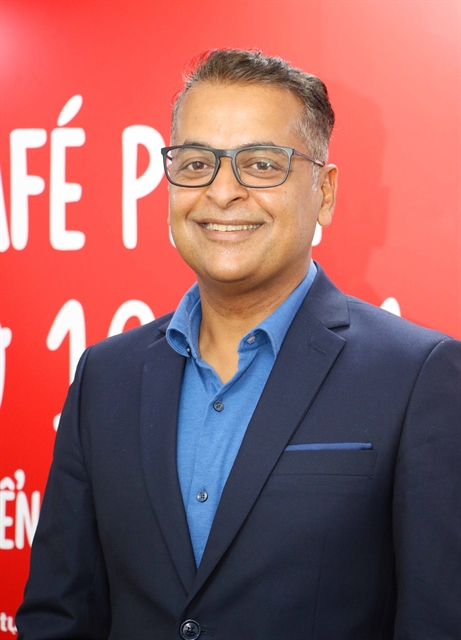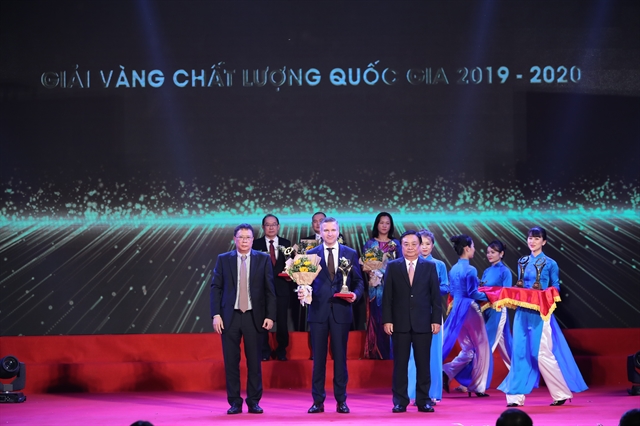[ad_1]

Nestlé Vietnam was awarded with the top prize as one of the winners of the Việt Nam National Quality Awards in Hà Nội recently. Binu Jacob, CEO of Nestlé Vietnam speaks with Việt Nam News about the award and the future plans of the firm in Việt Nam.
What helped Nestlé Vietnam win the top prize at the National Quality Awards?
We are very proud to have won the award as it is an end-to-end business excellence award as it covers all aspects of a business. It is the most comprehensive award for a business in Việt Nam so far.
The Việt Nam National Quality Awards include seven criteria – the role of business leaders; operational strategy; customer and market-centred policy; knowledge measurement, analysis and management; human resources management and development; process management; and operating results. The criteria are the values that shape behaviours of organisations and enterprises towards being highly effective.
What does the award mean to Nestlé Vietnam?
We want Nestlé Vietnam to be the leading, sustainable and ‘glocal’ company of Việt Nam. We want to lead in all aspects, sustainable in everything we do, we support the planet, ‘glocal’ is bringing the best of global technology, resources, capability and competency to support the local area, which is Việt Nam.
The award fits perfectly into our vision from leadership and sustainability. We are the only multi-national company to receive the award among local firms. We consider it our ‘glocal’ direction.
We are here to enhance the life of Vietnamese people. It is the purpose for our staying here in Việt Nam. Our ambition here is to grow sustainably and support the planet.
It is a source of encouragement that helps us to further invest in Nestle Vietnam to continue to deliver good values in Việt Nam, bringing more good elements to the products to serve the country.
The award also helps Nestlé Vietnam to learn, evaluate, and comprehensively improve our management activities and product quality. We also have a chance to share our best practices, technical advances, and initiatives with the community. Hopefully, the Vietnamese business community can replicate our initiatives across the country.
By participating in the award, we can learn more and have a dialogue with other companies in Việt Nam, while companies can improve themselves by adopting advanced management methods. Therefore, they can improve the productivity, quality, and competitiveness of their products and services in both local and foreign markets.
Building on the current success, we have crafted our plans for the next five years as a continuation of our legacy but also a step towards newer, more ambitious goals. There are several great things Nestlé Vietnam has done in the past which we are committed to keep. For instance, our emphasis on people will never change. We will also continue to enhance the agility of our operations and our factories.
However, there are three areas where I feel there is room for growth, such as consumer-centric innovation. We have done great work in the past, but moving forward, we need to adopt a more consumer-focused approach. The biggest success of Nestlé Vietnam is Milo, which addressed a real consumer need. Mothers in Việt Nam wanted to give their children nutritious milk which they enjoy drinking – and Milo met their expectations with all the goodness of micronutrients and milk plus an unrivalled signature taste. This is the kind of innovation that we want to start focusing on as it is consumer centric, differentiated, and can become big.
The second focus area is digitalisation. Today, I am confident we are at the head of the market but the pace of digitalisation will grow five-fold in the future, so we have to accelerate our efforts. Great strides have been made, for example farmers in Dak Lak have started using handheld devices to measure the quality of the soil, while buyers are starting to track where the coffee is coming from using technology – all with support from Nestlé Vietnam.
Moreover, just in the past six months our factories have developed 34 different apps to automate processes that were previously done manually, collecting vast amounts of data that is available across our operations.
The third focus area is sustainability. We are here to enhance the lives of Vietnamese people, and this includes making sure that none of the packaging we use today end up on the landfill or in the oceans. Today we are part of the problem, but we are working hard to become part of the solution.
Around 20 per cent of my time is now spent on our sustainability agenda, to harmonise efforts towards our ambitious goal that by 2025, we will take back all the plastic packaging we use by tying up with waste management companies and other relevant partners and stakeholders.
We will be the first company to eliminate the use of plastic straws when next month we move 100 per cent to sustainable-sourced paper straws for our Milo products.
We are also working to create actual demand for the collection of orphan plastics, setting off reuse and recycling efforts and kick-starting a circular economy. Nestlé is looking to lead the way as the co-chairs of the Việt Nam Business Council for Sustainable Development and Packaging Recycling Organization Vietnam, leading the way and inspiring others to follow.
One of the important criteria for the award is to have outstanding achievements in the quality of production, business operations and service? How does Nestle improve quality of production and business operations?
Our focus will be on food safety, people safety, innovation, digitalisation and sustainability.
Food safety and human safety is very important to us. Everyone involved in our value chain must remain safe. Coffee farmers in the fields, people working in the factory and trucks delivering our products must be safe.
We have been around for more than 150 years and the nutritional requirements of people has changed a lot. We have invested heavily in research and development such as in packaging along our value chain. We have more than 5,000 scientists working for new and necessary elements.
Sustainability is another key factor. We believe that doing the right thing is good for people and business.
Last but not least, strong compliance is very important. We are a food business, so we have lots of rules and regulations in food safety and people safety, which are also core values in our work in Việt Nam.

What kind of innovations and digitalisation have you made?
We have renovated the old brand over many years, making it adapt to the new needs of consumers. For example, we adjust the sugar levels in all products to change the elements of the products and better serve the new needs of the consumers.
On the journey of sustainability, we are changing our packaging. For example, we are gradually changing plastic straws to paper straws.
Digital transformation is the key for us to increase connectivity with all partners in our value chain in order to exchange information more efficiently and see the KPI in a better format, as well as our operations. Digital transformation will help us better understand the needs of consumers.
We will follow the end-to-end digital process from farming to products. All processes and the information will be connected with apps. It is a long-term focus, or we could be lost in the long run.
What have you done to cope with COVID-19 in Việt Nam?
Since the first outbreak last year, the teams are very well prepared to deal with all situations. We haven’t lost a single day of production in the last a year since the pandemic started.
At Nestlé Vietnam, we empower people, so our staff, from the lowest level, are confident in what they should do and we don’t waste time telling them about their work. We have six factories where staff talk, share things and learn from each other. Factories in Việt Nam are among the best Nestle factories in the world.
Now, as many other countries depend on Việt Nam for supply much more than before, our team are making their best efforts. Last year, many factories were impacted, but Nestlé Vietnam still managed the situation well and others became dependent on our production with a variety of products from Maggi to Milo. — VNS
|
Nestlé brings more “Made-in-Vietnam” products to the world Exports are an important part of Nestlé Vietnam’s strategy with the goal of making Việt Nam a regional supply hub. The company’s exports in 2020 grew by 20 per cent against the previous year. Coffee has long been a focus, but now Nestlé is looking to grow its culinary export portfolio as Việt Nam has become the culinary supply centre of the region. As the global brand of Nestlé Group with a history of over 100 years, MAGGI, a naturally fermented soya sauce, is widely used by consumers in nearly 200 countries around the world, said the company. Last year, the exports of Nestlé Vietnam’s MAGGI spicy products to the Philippines, Thailand and even markets with numerous high technical & regulatory standards such as the United States, Australia, Japan and Korea picked up both in volume and value. MAGGI products are also welcomed by Vietnamese consumers living abroad, including in markets with high demands for safety and food quality. At the same time, coffee exports under the NESCAFÉ brand of Nestlé in 2020 increased by 20 per cent over 2019. Every year, Nestlé globally purchases 20 to 25 per cent of Việt Nam’s coffee output to process worldwide into coffee products, with an average total value of US$600-700 million, maintaining the position as the biggest coffee buyer in Việt Nam. Locally, all Nestlé Vietnam’s NESCAFÉ products are made from 100 per cent high-quality Vietnamese coffee beans and are enjoyed domestically by Vietnamese customers; and exported to 25 markets for the love and joy of consumers around the world. In addition to processed coffee products made from Việt Nam’s specialty Robusta beans, Nestlé Vietnam also exports coffee made from sustainably sourced Arabica beans. Established in 1995, Nestlé Vietnam has continuously expanded its investment and diversified its product portfolio to serve the food and nutrition demand of consumers. The company aims to optimise the role of food to improve the quality of lives in Việt Nam today and in generations to come.— VNS |
[ad_2]
Source link
